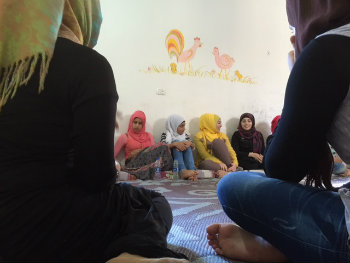Today marks the UN International Day of Elimination of Violence against Women, an opportunity for civil society organisations and political activists to galvanise action to end violence against women and girls around the world. According to the United Nations, 35% of women and girls globally experience some form of physical and/or sexual violence in their lifetime, with up to seven in ten women facing this abuse in some countries.
In light of the 2015 theme of ‘prevention’, we would like to draw attention to the efforts of Hivos and its partners in combatting gender-based violence (GBV) in Lebanon.
Empowering Syrian women refugees in Lebanon
Sara (not her real name) is a 25-year-old Syrian refugee living in Chatilla camp in Beirut. She was forced into marrying her cousin, who physically abused her. When he left her, she faced pressure to remarry against her will. This exemplifies the kind of challenges Syrian women face while living in refugee camps in Lebanon.
There are currently over 1 million refugees in Lebanon, of which Syrian women and children constitute roughly 80%, with 34% of households run by women. In this war-torn community, frustration, stress and poverty often lead to violence against women. Domestic violence, rape and child marriage occur on a large scale. Addressing these issues is often a taboo.
Hivos and its partners the Syrian League for Citizenship, Marsa Sexual Center and Abaad Resource Center for Gender Equality have joined hands to empower women and men to combat gender-based violence and promote sexual reproductive rights and health. Our work in the region includes psychosocial counselling, support groups, safe house provision, and voluntary counselling and testing for sexually transmitted infections. using non-traditional awareness and empowerment techniques such as interactive theatre and art expression. Hivos also involves men in tackling violence against women and eliminating child marriage by organising awareness and sensitising activities. This approach has given women in turn the confidence to tell their stories of violence, forced marriage and sexual abuse.
‘Society and my family reject me and I have been beaten’
Women with non-conforming gender and/or sexual orientations are often excluded from debates on gender-based violence. In Lebanon, these women are exposed to stigma, harassment and sexual and physical violence. Their lives are often controlled by the state, the social environment, educational and medical professionals, and even their own families. Due to the narrow definition of gender identity and discrimination in Lebanese society, many victims of sexual and domestic violence are structurally ignored.
To break this silence, our partner in Lebanon MOSAIC (the MENA Organization for Services, Advocacy, Integration and Capacity building) launched its ‘16 Days of Activism against Gender-Based Violence’ campaign. MOSAIC introduced its campaign with a video that brings us the stories of bisexual, lesbian, and trans women survivors of gender-based violence. The aim is to challenge the standard prevailing narrative and fight against sexual gender-based violence against ALL women.
This campaign is also fully supported by One More Cup Media Production




